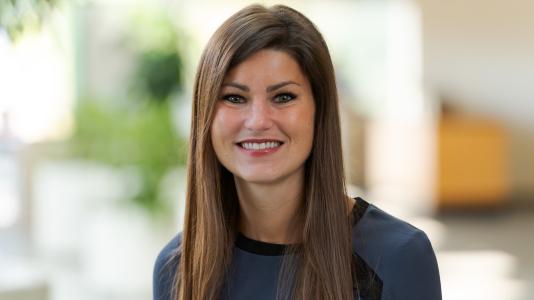
Environmental Engineer, AMD
Education: Ph.D. in Environmental Engineering (University of Illinois at Urbana/Champaign, 2017); M.S. in Environmental Engineering (University of Illinois at Urbana/Champaign, 2013); B.S. in Environmental Engineering (University of Illinois at Urbana/Champaign, 2011)
Hobbies: Cooking, reading, exercising, puzzles and games.
Lauren Valentino is an environmental engineer in the Bioprocesses & Reactive Separations group at Argonne National Laboratory, where she addresses the challenges associated with sustainable water and energy supplies.
Lauren’s fascination with engineering began when she was in college. “Before that point, I didn’t really know what engineers do. I was a problem-solver and had always liked math and science, but I wanted a career that could have an impact,” she said. “In college, I realized that engineers are designers, creators, and innovators, and their work can have a huge impact on the lives of others.”
During college, Lauren also participated in a senior-level engineering course that took her to Ethiopia in eastern Africa. There, she witnessed local difficulties in water access and quality, which fostered her interest in environmental engineering. “That experience inspired me to pursue a doctorate to address the global challenges related to sustainable, reliable, and cost-effective water and energy supplies,” she said.
Today, Lauren works in Argonne’s Bioprocesses & Reactive Separations group – part of the Applied Materials Division (AMD) – to develop separation processes for various applications, including desalination (removing salt from seawater), product/resource recovery, carbon dioxide capture, and waste-to-energy processes. She also evaluates the economic feasibility and environmental impacts of new technologies. In addition, she leads the Bioprocessing Separations Consortium, a multi-national laboratory collaboration working to overcome the technical challenges associated with the cost-effective production of biofuels and bioproducts.
“My work stands at the interface of several disciplines, including engineering, materials science, chemistry, and separation science. All of these fields are important, because I believe that integrated and multi-disciplinary approaches are necessary to address the world’s complex engineering challenges,” she said. “It’s clear that the work environmental engineers do is critical to maintaining the health and safety of our population and preserving the environment.”
In addition to her regular work at Argonne, Lauren has volunteered with Argonne’s science, technology, engineering and math (STEM) education activities with youth for more than three years. “Young women need successful female engineers to look up to and see their positive impact on the world, so as engineers and scientists, we have to act as role models,” she said. “We need to introduce more women to engineering by sharing our stories. Through the outreach programs at Argonne, I hope to inspire and motivate the next generation of scientists and engineers, especially young girls.”
Lauren also emphasizes the importance of having a diverse, well-rounded education. “Be prepared to work hard and study hard, but being an engineer means more than being good at math and science. Future engineers need to have the ability to access, understand, evaluate, and apply perspectives and knowledge from many fields,” she tells students. “Also, don’t be afraid of failure, or asking questions. Trial-and-error is unavoidable in STEM fields, so instead, embrace and learn from your mistakes. Everyone has to start from somewhere.”